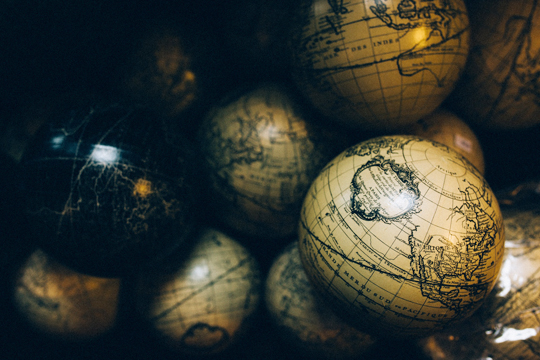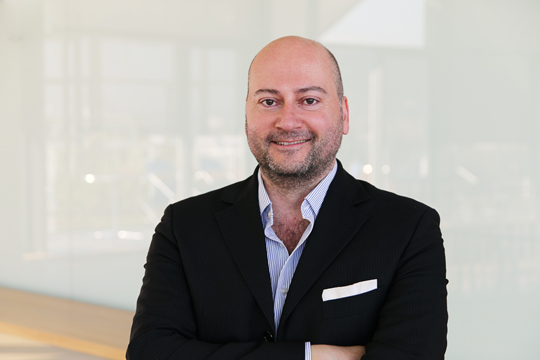Brave New World Disorder
Freiburg, Oct 15, 2018
Emerging countries like China, are pushing that old superpower, the US, further and further aside. Russia and India are champing at the bit as well. What happens when new, powerful players take the global stage? The Colloquium politicum is holding a nine-part series, “Schöne neue Weltunordnung?” (“Brave New World Disorder?”), to begin in the Winter semester of 2018/2019. Experts will analyze the trial of strength in talks including a debate and a panel discussion. Program Coordinator Dr. Arndt Michael has spoken with Rimma Gerenstein about how the global order is changing and why imbalances are no longer so easy to correct, which is why the title has an intentionally ironic undertone.

New Global Players: Throughout the series, experts will discuss the possible orientations that could result from political and economic tests of strength. Photo: Lena Bell/Unsplash
Mr. Michael, the series is called “A Brave New World Disorder.” What’s gone off the rails?
Arndt Michael: The US has dominated the world politically and economically since the end of the Cold War. It was a superpower of which one could assume that it would impart its values, keep the peace, and control international structures. Yet for years now, it can be seen that there are new players in the game. Emerging nations, such as China, which in the meantime has amassed so much political and economic strength, are challenging the dominance of the US. At the same time, the US is withdrawing from the role it has held up to now. In the Donald Trump era as characterized by the slogan “America first,” the country isn’t even sticking to the rules it once made itself.
Isn’t that more of a temporary imbalance? After the next US elections, the Ms. or Mr. President could straighten things out.
Not quite. A great change in the global order was already taking place during the administration of Barack Obama. It shifted focus from Europe and Latin America and turned clearly towards Asia. That was the start of the Pacific Age – China, India, and Japan became the more important partners. Trump is taking this twist to the extreme. Even now, many researchers are forecasting that his economic successes will pave the way for a second term in office. It is, therefore, a global disorder that can’t so easily be reversed. Several months ago, the chairman of the Munich Security Conference, Wolfgang Ischinger, described this situation as an “epochal shift.”
And you’d like to take a closer look at this epochal shift?
Precisely. From nine perspectives to be exact. All the lectures will address the question of how the global order is changing. Among these will be viewpoints from Africa, China, India, Latin America, Europe, and of course the USA. We’re opening on 16 October with a lecture on Russia and rounding off with a final panel discussion called “Bye-bye Britain” on 14 March 2019, two weeks before Brexit on 29 March. There we’ll discuss the question of whether the European Union can maintain its position as a dominant economic power in the new global order.

Program Coordinator Arndt Michael has set up the new series and is already gathering ideas for a sequel. Photo: Sandra Meyndt
In the name of the lecture series, you’re alluding to Aldous Huxley’s famous novel, “Brave New World.” Won’t the audience be a bit anxious after nine lectures about dystopias?
Huxley creates a world that seems beautiful, peaceful, and safe, but is actually a dictatorship in which drugs are used to control and keep people compliant. We’re a long way from that. It was important to me to choose a title that didn’t sound trite. For a few years now, the concept “global disorder” has been prominently represented in the media. Frank-Walter Steinmeier, Germany’s foreign minister at the time, used the expression in a very well-respected speech, for example. And global disorder is exactly what’s going on now. We do not have a superpower to keep order. You can already question whether that’s a good thing. Should we be happy about it? Is it something new, or is it reminiscent of a situation from the past – for example the “Concert of Europe” during the 19th century, in which the major European powers wanted to divide up the world among themselves.
But that didn’t work out so well.
It went horribly wrong. An ironic undertone is supposed to resonate from the title: “Brave New Global Disorder.” No one knows how the world will develop. We can only make predictions and discuss different possibilities. That’s the aim of this series. If it is well received, then I’ve already got quite a few ideas about how we could continue it in the Summer semester. In terms of content, focusing on Africa and China would be exciting. A current project of the Chinese government, the “New Silk Road,” is a fitting example. Many researchers say that the “Silk Road” is China’s response to a western dominated world and will cement its position as a preeminent economic power – with alliances and dependencies that are shaped according to Chinese values.
Program for the series “Schöne neue Weltunordnung” (“Brave New Global Disorder”)
The new program of the Colloquium politicum and Studium generale

